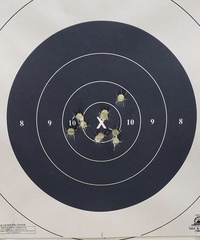How low can you go before... DETONATION!?
+7
james r chapman
Tim:H11
oldsalt444
BE Mike
dronning
USSR
10sandxs
11 posters
Page 1 of 1
 How low can you go before... DETONATION!?
How low can you go before... DETONATION!?
I've been reloading for over 30 years now and while in my younger days, the push was to faster and hotter loads, once I started competitive shooting, that outlook changed (obviously). I find it a bit ironic that I'm now wondering how slow I can go before bad things start to happen. Do bad things happen at low speed???
On to the question. I purchased a large quantity of vectan BA10 several years ago. At the time, it was a very inexpensive powder and it does very well in short line loads. Recoil is maybe a but snappier but I've grown accustomed to it. That is untill I started loading zero jacketed bullets for long line. It seems to me that they are softer shooting than my short line loads, even at 5 gr of wst. The short line load is 3.0 grains of BA10 and a 185 (ish) h&g130, already under the minimium published load. For kicks, I loaded 10 rounds at 2.5 gr. To my supprise, they cycle my 45 with better than expected ejection. Well, what the heck... lets go to 2.0 grains... while ejection was notably less positive, all ten rounds made it out of the gun and into my brass catcher. Yes, they were VERY soft shooting.
On the way home, I remembered reading an article years ago on "detonation" a proported phenomenon where the powder doesn't burn as it normally does, all powder burns instantly, producing an explosion rather than a smooth burn. It was proported to happen only with fast burning powders in relativly large capicity cases at really light loads... BA10, very fast powder... 45 acp, relativly big case... 2.0 gr BA10, 40% under minimium suggested load... gulp...
So... has anyone got thoughts on the possibility of detonation? My recollection in the article was that it was probably a myth, and a much more reasonabe explination for blown up guns was the likely hood of a double charge of fast powder, which seems reasonable. But what if...
On to the question. I purchased a large quantity of vectan BA10 several years ago. At the time, it was a very inexpensive powder and it does very well in short line loads. Recoil is maybe a but snappier but I've grown accustomed to it. That is untill I started loading zero jacketed bullets for long line. It seems to me that they are softer shooting than my short line loads, even at 5 gr of wst. The short line load is 3.0 grains of BA10 and a 185 (ish) h&g130, already under the minimium published load. For kicks, I loaded 10 rounds at 2.5 gr. To my supprise, they cycle my 45 with better than expected ejection. Well, what the heck... lets go to 2.0 grains... while ejection was notably less positive, all ten rounds made it out of the gun and into my brass catcher. Yes, they were VERY soft shooting.
On the way home, I remembered reading an article years ago on "detonation" a proported phenomenon where the powder doesn't burn as it normally does, all powder burns instantly, producing an explosion rather than a smooth burn. It was proported to happen only with fast burning powders in relativly large capicity cases at really light loads... BA10, very fast powder... 45 acp, relativly big case... 2.0 gr BA10, 40% under minimium suggested load... gulp...
So... has anyone got thoughts on the possibility of detonation? My recollection in the article was that it was probably a myth, and a much more reasonabe explination for blown up guns was the likely hood of a double charge of fast powder, which seems reasonable. But what if...
10sandxs- Posts : 972
Join date : 2016-01-29
 Re: How low can you go before... DETONATION!?
Re: How low can you go before... DETONATION!?
The secondary explosion phenomenon is linked to slow rifle powders in small charge weights in large rifle cartridge cases. No problem associated with small charge weights of fast pistol powders in handgun loads that I am aware of.
Don
Don

USSR- Posts : 352
Join date : 2017-07-14
Age : 74
Location : Finger Lakes Region of NY
 Re: How low can you go before... DETONATION!?
Re: How low can you go before... DETONATION!?
The explanation I read was that in a round with a long case (rifle or maybe a .38/.357) if your powder was so low that it laid below the primer the primer flash would ignite the surface of the powder along the length of the case (verses from the back to the front) creating detonation.
I know weird things can happen during any type of combustion but this sounds like it needs to be a perfect storm.
- Dave
I know weird things can happen during any type of combustion but this sounds like it needs to be a perfect storm.
- Dave

dronning- Posts : 2581
Join date : 2013-03-20
Age : 71
Location : Lakeville, MN
 Re: How low can you go before... DETONATION!?
Re: How low can you go before... DETONATION!?
IIRC, the American Rifleman put this to bed in the '70's, but every once in a while the subject is raised.

BE Mike- Posts : 2589
Join date : 2011-07-29
Location : Indiana
 Re: How low can you go before... DETONATION!?
Re: How low can you go before... DETONATION!?
Thanks everyone, my recollection was that it wasn't an issue, but it's one of those, "did I lock the door when I left today" nagging things the I wanted to put to bed...
Now to load 14,000 rounds of short line ammo to use the rest of the powder I've got...
Now to load 14,000 rounds of short line ammo to use the rest of the powder I've got...
10sandxs- Posts : 972
Join date : 2016-01-29
 Re: How low can you go before... DETONATION!?
Re: How low can you go before... DETONATION!?
IIRC, this problem occurs in pistols using low amounts of slow burning magnum powder (H110, 296) in big cases, notably 44 Mag. The theory is that instead of igniting the just the back end of the charge near the primer, the extra space inside the case allows the spark to ignite both the front AND the back of the charge at the same time. This creates a double pressure curve resulting in an explosion and flying metal chunks of your gun. This is why all the reloading manuals state that a 95% load density is needed with these powders. Fast burning bullseye powders just don't have this problem.

oldsalt444- Posts : 288
Join date : 2011-10-26
Location : Commiefornia
 Re: How low can you go before... DETONATION!?
Re: How low can you go before... DETONATION!?
oldsalt444 wrote:IIRC, this problem occurs in pistols using low amounts of slow burning magnum powder (H110, 296) in big cases, notably 44 Mag. The theory is that instead of igniting the just the back end of the charge near the primer, the extra space inside the case allows the spark to ignite both the front AND the back of the charge at the same time. This creates a double pressure curve resulting in an explosion and flying metal chunks of your gun. This is why all the reloading manuals state that a 95% load density is needed with these powders. Fast burning bullseye powders just don't have this problem.
No, the W296/H110 minimum powder amount problem is an issue related entirely to the specific powder itself and does not result in a secondary explosion effect, but rather, other undesireable results. There are zero problems when using other slow pistol powders such as IMR4227 with minimal amounts of powder in big cases like the .44 Magnum and .45 Colt.
Don

USSR- Posts : 352
Join date : 2017-07-14
Age : 74
Location : Finger Lakes Region of NY
 Re: How low can you go before... DETONATION!?
Re: How low can you go before... DETONATION!?
Not any real help to this conversation but my friends years ago tried an experiment with a muzzleloader. Trying to see if they could get a charge to bounce the ball off the 25 yard cardboard. It struck and stuck in the cardboard. Black powder is very forgiving so long as the projectile is seated all the way. Never heard of a light charge in a metallic casing doing anything other than a squib. Light rifle charges I know people to use a filler in the shell to keep the powder against primer.

Tim:H11- Posts : 2133
Join date : 2015-11-04
Age : 36
Location : Midland, GA
 Re: How low can you go before... DETONATION!?
Re: How low can you go before... DETONATION!?
And, Cream of Wheat..

james r chapman- Admin
- Posts : 6372
Join date : 2012-01-31
Age : 75
Location : HELL, Michigan
 Re: How low can you go before... DETONATION!?
Re: How low can you go before... DETONATION!?
USSR wrote:oldsalt444 wrote:IIRC, this problem occurs in pistols using low amounts of slow burning magnum powder (H110, 296) in big cases, notably 44 Mag. The theory is that instead of igniting the just the back end of the charge near the primer, the extra space inside the case allows the spark to ignite both the front AND the back of the charge at the same time. This creates a double pressure curve resulting in an explosion and flying metal chunks of your gun. This is why all the reloading manuals state that a 95% load density is needed with these powders. Fast burning bullseye powders just don't have this problem.
No, the W296/H110 minimum powder amount problem is an issue related entirely to the specific powder itself and does not result in a secondary explosion effect, but rather, other undesireable results. There are zero problems when using other slow pistol powders such as IMR4227 with minimal amounts of powder in big cases like the .44 Magnum and .45 Colt.
Don
I still wouldn't be too willing to underload 2400 or 4227. But, you have a point considering that H110/296 must be a hotter burner. H110/296 will melt the bases of cast boolits where 2400 and 4227 won't do that. You'd need gas checks otherwise.

oldsalt444- Posts : 288
Join date : 2011-10-26
Location : Commiefornia
 Re: How low can you go before... DETONATION!?
Re: How low can you go before... DETONATION!?
The explosive power of smokeless powder is extremely dangerous when confined to a small container. In addition, certain smokeless powders with a high-nitroglycerine concentration can be induced to detonate.
The key word is "confined" http://www.firearmsid.com/Feature%20Articles/McCord_gunpowder/
Secondary pressure spikes happen in large magnum rifles, with slow burn rates of powder, non-magnum primers, light for caliber bullets. A long free bore also helps.
https://thefiringline.com/forums/showthread.php?p=4928827#post4928827
The key word is "confined" http://www.firearmsid.com/Feature%20Articles/McCord_gunpowder/
Secondary pressure spikes happen in large magnum rifles, with slow burn rates of powder, non-magnum primers, light for caliber bullets. A long free bore also helps.
https://thefiringline.com/forums/showthread.php?p=4928827#post4928827

243winxb- Posts : 344
Join date : 2013-12-01
Age : 80
Location : USA
 Re: How low can you go before... DETONATION!?
Re: How low can you go before... DETONATION!?
I have tried tamping toilet paper on top of 2400 for .357 cases and double ended 148 wc. Don't do it anymore, 3-3.1 gr BE works good enough. 38 special case with 2.8 is best.
chopper- Posts : 820
Join date : 2013-10-29
Age : 72
Location : Western Iowa
 Re: How low can you go before... DETONATION!?
Re: How low can you go before... DETONATION!?
I had a 44 Mag blow up in my hand. It was a Ruger Super Blackhawk. Split the cylinder in half and jammed it into the frame. Also knocked me on my butt. It was factory ammo. Hindsight being 20/20 I decided to check it out. It was Russian made and there was a recall on it 10 years before I fired it. Apparently the powder was nitro based and the nitro used in it separated. Not a re-loaders problem but beware of any yellow box 44 Mag made in Russia.
Len
Len

LenV- Posts : 4770
Join date : 2014-01-24
Age : 74
Location : Oregon
 Re: How low can you go before... DETONATION!?
Re: How low can you go before... DETONATION!?
296/H110: Powder needs heat and pressure to burn. VERY occasionally, it was found that the standard 10% drop from MAX for a start load would allow a semi-molten wad of powder to lodge in the barrel, creating a barrel obstruction. This is NOT an issue with 2400.
Detonation: Norma, I think, found that in order to produce a detonation, they had to have very specific conditions, one of which was to have half the powder packed near the bullet and half packed near the primer. Conclusion: it could NEVER happen while shooting. Also, as stated, it takes a large case and a small charge of very slow powder.
Personally, to me, if it was really possible, every demolition company would use the technique to save on explosives.
MythBuster tried to do this in the open air when someone said that two explosions going off at once would produce a higher pressure than the same total charge going off in one location. They found it NOT true.
Detonation: Norma, I think, found that in order to produce a detonation, they had to have very specific conditions, one of which was to have half the powder packed near the bullet and half packed near the primer. Conclusion: it could NEVER happen while shooting. Also, as stated, it takes a large case and a small charge of very slow powder.
Personally, to me, if it was really possible, every demolition company would use the technique to save on explosives.
MythBuster tried to do this in the open air when someone said that two explosions going off at once would produce a higher pressure than the same total charge going off in one location. They found it NOT true.
noylj- Posts : 433
Join date : 2012-03-09
Age : 75
Location : SW USA
Page 1 of 1
Permissions in this forum:
You cannot reply to topics in this forum